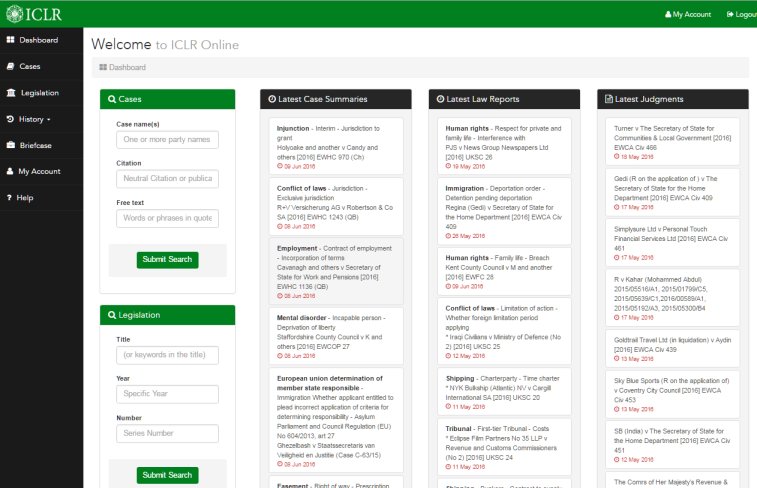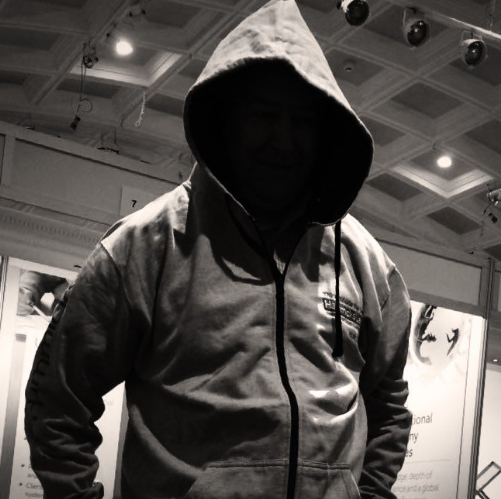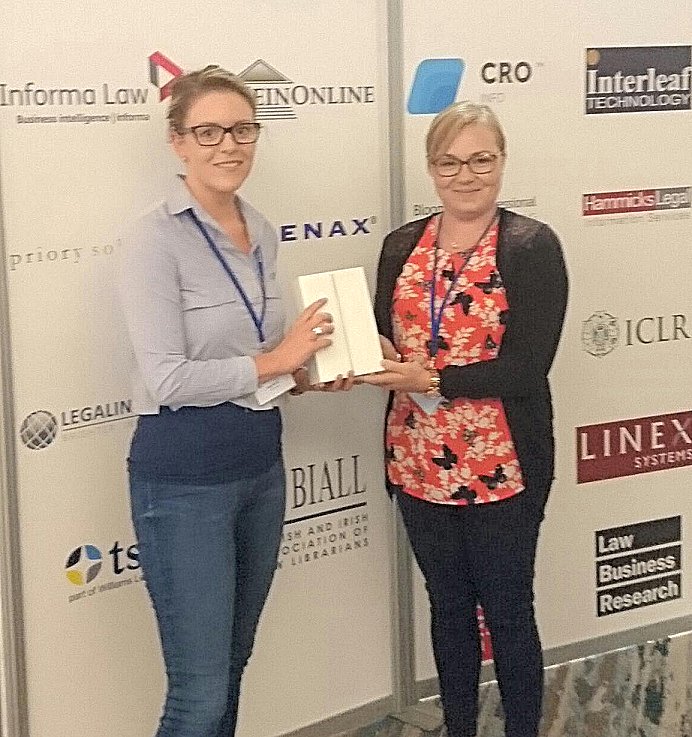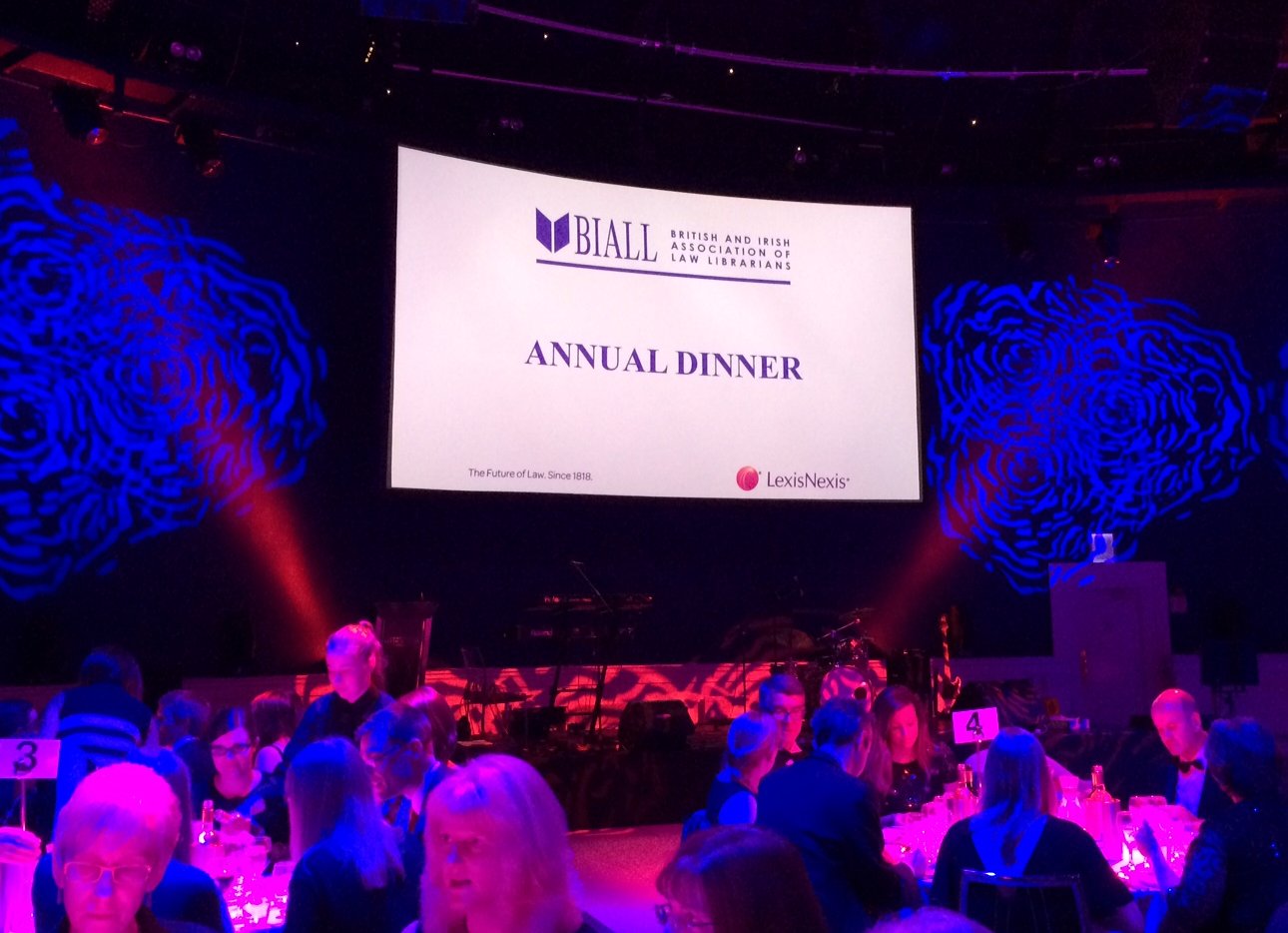In Dublin for #biall2016: conference diary – continued
The story so far: Team ICLR is in Dublin for the annual conference of the British and Irish Association of Law Librarians. (Link to the earlier post here.) Now read on. Thursday 9 June Start of the conference proper. Our task is to explain what ICLR does to the newer delegates who may not already
The story so far: Team ICLR is in Dublin for the annual conference of the British and Irish Association of Law Librarians. (Link to the earlier post here.) Now read on.
Thursday 9 June
At the @TheICLR stand, @Hasto1 and I, relaxed and ready for the delegates at #biall2016 in Dublin pic.twitter.com/06NGijQ1nr
— Paul Magrath (@Maggotlaw) June 9, 2016
Start of the conference proper. Our task is to explain what ICLR does to the newer delegates who may not already know us, and to catch up and get feedback from the familiar faces in the crowd. But the day begins with all the delegates in plenary session in the main meeting room, leaving vendors idling at their stands, or wandering around comparing each other’s branded gifts and goodies. ICLR has some handsome hardbound notebooks on offer, as well as handy foldaway carrier bags, travelcard holders, plus the ever popular pencils and pens (people never seem to have enough). We also have copies of our famous collection of favourite cases published last year to mark our 150th Anniversary, copies of which can be ordered from the stand.
And we are ready to demonstrate the product, ICLR Online.

Later…
Taking time off from the exhibition hall, I like to pop into the occasional talk or session. This afternoon, in one of a series of parallel sessions, Tracey Dennis and Catherine McArdle (deputy librarians of Inner Temple and Lincoln’s Inn respectively) gave us “A tale of two libraries: Inner Temple and Lincoln’s In, Past, Present and Future”.
They explained how the Inns came about in the first place, as a place for lawyers to collect in London after the Palace of Westminster became the central courts complex in the 14th century, and lawyers began to adopt an apprenticeship system. Libraries became established in the Inns from the late 15th century, Lincoln’s Inn in 1485.
The libraries of the four Inns (Gray’s Inn, Lincoln’s Inn, Inner and Middle Temple) now house unique collections of national importance. They deliver free services to members wherever they are based, helping them do their legal research, and ensuring the materials they need are available. Barristers use the libraries as a place of quiet work, but also as a hub for networking and collaboration, in some cases as a physical location for virtual chambers office space. The Inns are by their nature collegiate, like a “domus” dinner in hall, where pupils, barristers and benchers are all mixed up on the same tables.
Important parts of the collections are the old editions of English textbooks, which are surprisingly often consulted (sometimes for intermediate versions of oft-amended legislation) and the collections of Commonwealth legal materials which it would be hard to find anywhere else.
With online database material, however convenient to search and retrieve, you are always at the mercy of the publishers. Hence the value of retaining the hard copy versions wherever possible. A good library contains not just the commonly used materials but also those rarer items kept for “just in case” scenarios. But the libraries are not stuck in a timewarp and provide online services to their members too (albeit not remotely, because publishers did not facilitate it yet). Older practices, such as noting up cases which have been judicially considered in later cases, formerly done in neat red ink handwriting, can now be obtained via electronic databases.
The virtue of a well stocked library is that it serves all the lawyers who used it, rich or poor, young or old, the same comprehensive service. Between the four of them, the Inn libraries cooperate to manage collections, specialisations, jurisdictions, subject areas, and opening hours.
The talk concluded with a brief discussion of plans for the future of both libraries.
Among the many branded gifts and gadgets with which the other vendors were giving out, Hammick’s hoodies really stood out. So much so, that your diarist felt the need to pose in one:

Friday 10 June
Another day of demos and networking. Today’s lunch consisted of some rather fancy finger food, such as fish’n’chips in a paper cone, mini-burgers, and fishcakes brought round by the caterers instead of the canteen queue for the buffet of yesterday. However, there was that rather formidable chocolate mousse cake yesterday… but enough about food.
Or rather, let’s concentrate on food for thought. Today, this came from some more of those lightning talks (given in 10 minutes, and not a second longer, or else the crack of thunder sounds with a note of dreadful finality to conclude your submissions).
Today’s highlight (for me at least) was Alan Blanchard of the Financial Conduct Authority discussing the publication of the FCA Handbook in its online edition.
The Financial Conduct Authority is a rule-making body with a duty to publish those rules. It publishes 1500 pages a year. The rules govern every aspect of financial activity regulated by the Authority. There are 12,000 rules, 8,000 guidance provisions, and the various components of the handbook take up 9,000 pages in the print edition. These include High Level Standards, Prudential Standards, Business Standards, Regulatory Processes, Redress, Specialist Sourcebooks, Listing, Prospectus and Disclosure Rules, Handbook Guides and Regulatory Guides. So putting it all online and keeping it up to date and consolidated is a massive task.
The online version makes it easy to find and read the provisions of the Handbook, not just in the current edition but, via a timeline of amendment, in any of their previous editions. (As former editor of the Business Law Reports I can personally vouch for the ease of use of the online Handbook, which I have often had to use to check quotations in reported judgments.)
Later…
This second full day of the conference ended with a trip to the Mansion House for the Lexis-sponsored gala dinner.
Outside, it was pouring with rain, but inside it was pouring with wine and beer – in one case rather literally. Commiserations to the chap from Informa over whose head and all over whose suit one of the waiters accidentally dropped a pint of lager. He was very decent and gentlemanly about it all, pretending not to mind much really, but it would have taken more than a decent whisky to have placated me in such circumstances, I fear.
After dinner, the band came on and with a mixture of hits ancient and modern, including some Irish numbers, and drew out the secret dancers among the guests.
Saturday 11 June
 The conference concluded with some final talks and a distribution of prizes. The lucky winner of the ICLR prize draw for an iPad Mini was Jean Earley, Assistant Librarian at the Dublin-based Irish law firm McCann FitzGerald, photographed here with Holly Powell of ICLR.
The conference concluded with some final talks and a distribution of prizes. The lucky winner of the ICLR prize draw for an iPad Mini was Jean Earley, Assistant Librarian at the Dublin-based Irish law firm McCann FitzGerald, photographed here with Holly Powell of ICLR.
And so concludes this account of #biall2016. Next year’s conference will be in Manchester. See you all again there.
This post was written by Paul Magrath, Head of Product Development and Online Content at ICLR, who also tweets as @maggotlaw. It does not necessarily represent the opinions of ICLR as an organisation. Comments welcome on Twitter @TheICLR.
